Theater
FALL ARTS 2016: ‘Cloud Nine’ for theater lovers
‘Angels,’ ‘Carousel,’ ‘Urinetown’ and much more on D.C. stages
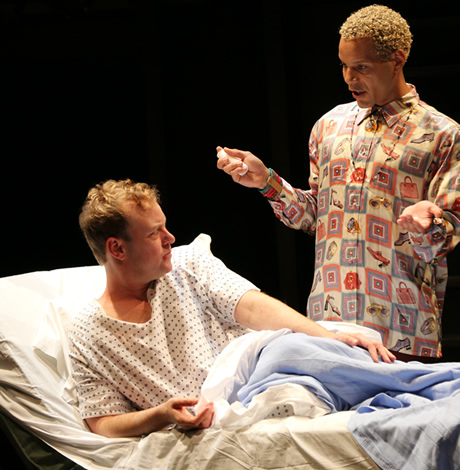
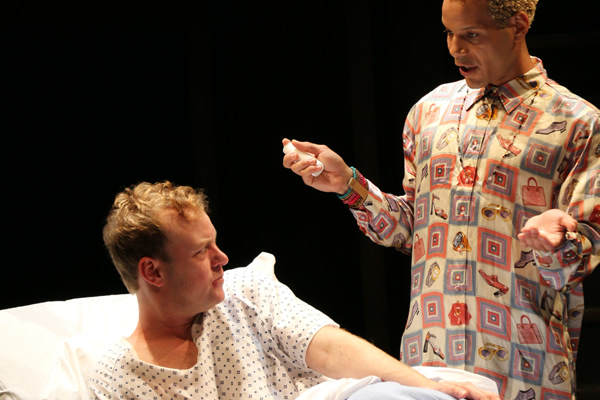
The oft-revived ‘Angels in America’ is on stage through Oct. 30 at Round House Theatre. (Photo courtesy Round House)
With its scores of transporting theatrical offerings there’s something to suit all tastes: original works, national tours of recent Broadway hits and retooled chestnuts. Here are a few.
At Gala Hispanic Theatre, Helen Hayes Award-winning out director José Luis Arellano stages the world premiere “Cervantes: El último Quijote (The Last Quixote)” in Spanish with English subtitles (through Oct. 2). The new drama focuses on the most tempestuous periods in the great Spanish writer’s life and the furious creativity of his final years. The top notch cast includes Luz Nicolas and out actors Eric Robledo and Erick Sotomayor.
Ford’s Theatre’s “Come From Away,” (through Oct. 9), the uplifting Broadway-bound new musical tells the story of how a small Canadian town cared for 6,579 airline passengers stranded there on 9-11. The cast includes the exceedingly talented out Broadway veteran Jen Colletta.
Round House Theatre and Olney Theatre Center are co-producing out playwright Tony Kushner’s Pulitzer Prize- and Tony Award-winning work “Angels in America: Part I: Millennium Approaches & Part II: Perestroika” (through Oct. 30). Set in mid-‘80s New York, “Angels” explores sexuality, religion and politics at the beginning of the AIDS crisis. A strong cast includes local out actors Tom Story, Jon Hudson Odom, and Sarah Marshall who plays — among other parts — Mormon matron Hannah Pitt, executed spy Ethel Rosenberg and an Orthodox rabbi.
At Studio Theatre, out director Michael Kahn is staging Caryl Churchill’s “Cloud Nine” (through Oct. 16), the work that put her on the map. This gender-bending experimental comedy is set both in Victorian era colonial Africa and post-sexual revolution 1970s London. The cast includes talented out actor Holly Twyford.
Shakespeare Theatre Company’s out associate artistic director Alan Paul is helming a much anticipated “Romeo & Juliet.”(Sept. 13-Nov. 6). After directing especially well-received musicals “Kiss Me, Kate” and “Man of La Mancha,” this is Paul’s first Shakespeare production at STC.
Theater Alliance presents the regional premiere of Kimber Lee’s “brownsville song (b-side fortray)” (Sept. 15-Oct. 9). Directed and choreographed by Paige Hernandez, Lee’s hopeful drama centers on life in the Brownsville neighborhood of Brooklyn where a senseless act of violence kills a young man and leaves his family to deal with the grief.
“Urinetown” (through Oct. 9) has come to Constellation Theatre. The Tony Award-winning musical is about a town whose dire water shortage prompts its plucky population to rise up against the evil corporation that has put a ban on private toilets. Constellation’s artistic director Allison Arkell Stockman directs this seriously funny satire.
With “The Last Schwartz” (through Oct. 2), Theatre J puts the spotlight on family dysfunction. Deborah Zoe Laufer’s absurd and thoughtful comedy follows the woes of a splintering Jewish family whose chances of coming back together appear slim to none. The production marks the D.C. area directing debut of the company’s out artistic director Adam Immerwahr.
Woolly Mammoth Theatre Company’s season opener, an absurdist comedy titled “Collective Rage: A Play in Five Boops” (Sept. 12-Oct. 9), features five women all named Betty who according to Woolly Artistic Director Howard Shalwitz “represent a wide range of feminine archetypes, each of whom feels trapped in a box of some kind.” The magic of the play lies in the transformative power of bringing them together around an absurd theatrical project and witnessing how they discover their truest selves by engaging with other women who are totally different.” Penned by Jen Silverman, the world premiere is directed by Mike Donahue and boasts a fine cast including Beth Hylton, Dorea Schmidt, Natascia Diaz, Kate Rigg and Felicia Curry as the Bettys.
Signature Theatre opens the season with local playwright Audrey Cefaly “The Gulf” (Sept. 13-Nov. 6). Billed as a provocative comedy, it’s the story of a lesbian couple played by Rachel Zampelli and Maria Rizzo whose fishing trip goes wrong when their boat breaks down and they become stranded far from shore. “The Gulf” is staged by out director Joe Calarco.
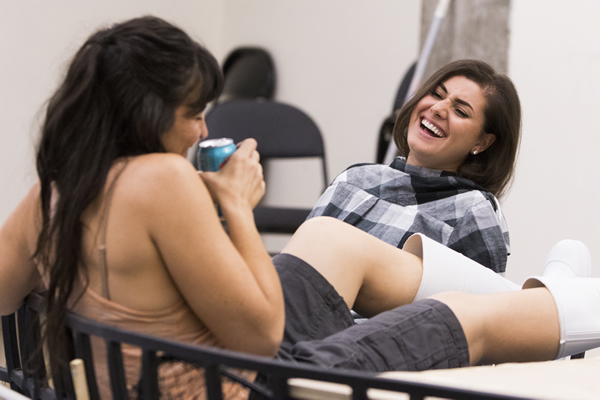
Maria Rizzo and Rachel Zampelli in ‘The Gulf’ at Signature Theatre. (Photo by Christopher Mueller)
Theater J is offering “The Last Schwartz,” an “absurd and thoughtful comedy about a dysfunctional Jewish family,” through Oct. 2 and “The Christians,” a “big play about faith in America and the power of religion to unite or divide” from Nov. 16-Dec. 11. Drag ensemble the Kinsey Sicks return for “Oy Vey in a Manger” there Dec. 20-28. Details at theaterj.org.
Helen Hayes-winning out actor Rick Hammerly is directing Alfred Uhry’s “Driving Miss Daisy” (Sept. 28-Nov. 6) as the Riverside Theater in Fredericksburg, Va. This tender exploration of the relationship between an elderly white woman and her black chauffeur in Atlanta stars Karen Grassle, best known as patient and resourceful Ma from TV’s “Little House on the Prairie.”Hammerly reports Grassle is lovely.
At Arena Stage, out artistic director Molly Smith is staging Rodgers and Hammerstein’s “Carousel” (Oct. 28-Dec. 24) with a large cast lead by Arena veterans E. Faye Butler and talented out actor Nicholas Rodriguez. The beloved 1945 musical centered on the passionate union of bad boy carnival barker Billy Bigelow (Rodriguez) and millworker Julie Jordan, and features classic songs like “June Is Bustin’ Out all Over” and “You’ll Never Walk Alone.”
In October, Capital Fringe presents Fringe POP (Oct.6-9), the first of a new annual project that explores ways of blending projections and live performance. Fringe POP explores how we experience public and private spaces by pairing films with 10-minute plays to create two distinctive presentations.
Broadway comes to D.C. this fall. The Kennedy Center presents the national tour of “The Curious Incident of the Dog in the Night-Time” (Oct. 5-23). The multiple Tony Award-winning drama follows smart but awkward teenage Christopher who after being accused of killing a neighbor’s dog embarks on an investigation that leads to a life-changing adventure.”
And at National Theatre, the national tour of the multiple Tony Award-winning musical “Once” is slated for a short run (Nov. 25-27). Based on the Academy Award-winning film, “Once” is the story of an Irish musician and a Czech immigrant whose love of music draws them into a complicated romance.
And finally, for those who aren’t yet politically sated, Washington Improv Theater presents its fourth edition of “POTUS Among Us” (Oct. 12-Nov. 6), a satire of the presidential election process where audiences help decide who becomes the next president. Wonder if any of the candidates will have orange hair?

It’s been a year filled with drama and music, re-imaginings and new works. There was a lot on offer in 2025, and much to enjoy. Here are 10 now-closed productions that come to mind.
On Valentine’s Day at Folger Theatre on Capitol Hill, out actor Holly Twyford served as narrator for “The Love Birds” a Folger Consort work that melds medieval music with a world-premiere composition by acclaimed composer Juri Seo and readings from Geoffrey Chaucer’s “A Parlement of Foules”
Standing behind a podium, Twyford beautifully read Chaucer’s words (translated from Middle English and backed by projected slides in the original language), alternating with music played on old and new instruments.
While Mosaic Theater’s “A Case for the Existence of God,” closed in mid-December, it’s proving a production not soon forgotten. Precisely staged by Danilo Gambini, and impressively acted by Lee Orsorio and Jaysen Wright, the soul-searching two hander by out playwright Samuel D. Hunter, tells the story of two men who form an unlikely friendship based on single-fatherhood, a specific sadness, and hope.
The action unfolds in a small office in southern Idaho, where the pair discuss the perplexing terms of a mortgage loan while delving deep into their lives and backgrounds. Nothing is left off the table.
Shakespeare Theatre Company’s spring production of “Uncle Vanya” gave audiences something both fresh yet enduring. Staged by STC’s artistic director Simon Godwin, the production put an impeccably pleasing twist on Russian playwright Anton Chekhov’s classic. It ranks among the very best area productions of the year.
Featuring a topnotch cast led by Hugh Bonneville (TV’s “Downton Abbey”) in the title role, the play was set on an unfinished stage cluttered with costume racks and assorted props, all assembled by crew uniformed in black and actors in street clothes. Throughout the drama tinged with comedy, the actors continued to assist with ever increasingly period set changes accompanied by an underscore of melancholic cello strings. It was innovative and wonderful.
GALA Hispanic Theatre’s production of Manuel Puig’s “Kiss of the Spider Woman” was an intimate and affecting piece of theater. Staged by José Luis Arellano, it starred out actors Rodrigo Pedreira and Martín Ruiz as two very different men whose paths cross as convicts in an Argentine prison.
Arena Stage scored with a re-imagined and updated take on the widely liked musical “Damn Yankees.” Directed by Sergio Trujillo, the Broadway bound production has been “gently re-tooled for its first major revival in the 21st century,” moving the action from the struggling Washington Senators baseball team to the turn-of-the-century Yankees lineup. Ana Villafañe’s charmingly seductive Lola and a chorus of fit ball players made for a good time.
Also at Arena, out playwright Reggie D. White’s new work “Fremont Ave.” was very well received. A semi-autobiographical glimpse into home and the many definitions of that idea specifically relating to three generations of Black men, the work boasts a third act with a deeply queer storyline to boot.
Before his smash hit “Hamilton” transformed Broadway, Lin-Manuel Miranda wrote “In the Heights,” a seminal musical set against the vicissitudes of an upper Manhattan bodega. Infused with hip-hop, rap, and pop ballads, the romance/dramedy takes place over a lively few days in the vibrant, close-knit Latin neighborhood, Washington Heights.
Signature Theatre’s exciting take on “In the Heights” featured a talented cast including out actor Ángel Lozado as the bodega owner who figures prominently in the barrio and the action.
Studio Theatre’s recent production of lesbian playwright Paula Vogel’s newest work “The Mother Play,” a drama with humor, is about a well put together alcoholic mother and her two gay children living under difficult circumstances in the less glitzy parts of suburban Maryland. With nuanced performances and smart direction, the production was terrific.
Keegan Theatre surpassed expectations with its production of “Lizzie” a punk rock opera about Miss Borden, the fabled axe wielding title character. Performed by a super all-female cast, they belted a score that hits hard on subjects like money, queerness, and strained (to say the least) family relationships.
Round House Theatre impressed autumn audiences with “The Inheritance,” a two-part drama sensitively staged by out director Tom Story and acted by a mostly queer cast that included young actor Jordi Bertrán Ramírez in a breakout performance.
Penned by out playwright Matthew López, the epic work inspired by E.M. Forster’s novel “Howards End,” explores themes of love, legacy, and the AIDS crisis through the lives of three generations of gay men in New York City.
Prior to opening, Story commented that with the production’s predominately queer cast you get actors who “really understand the situation, the humor, and the struggle. It works well.” And he was right.
Theater
Out actor talks lead role in ‘Fiddler on the Roof’
Signature Theatre production runs through Jan. 25
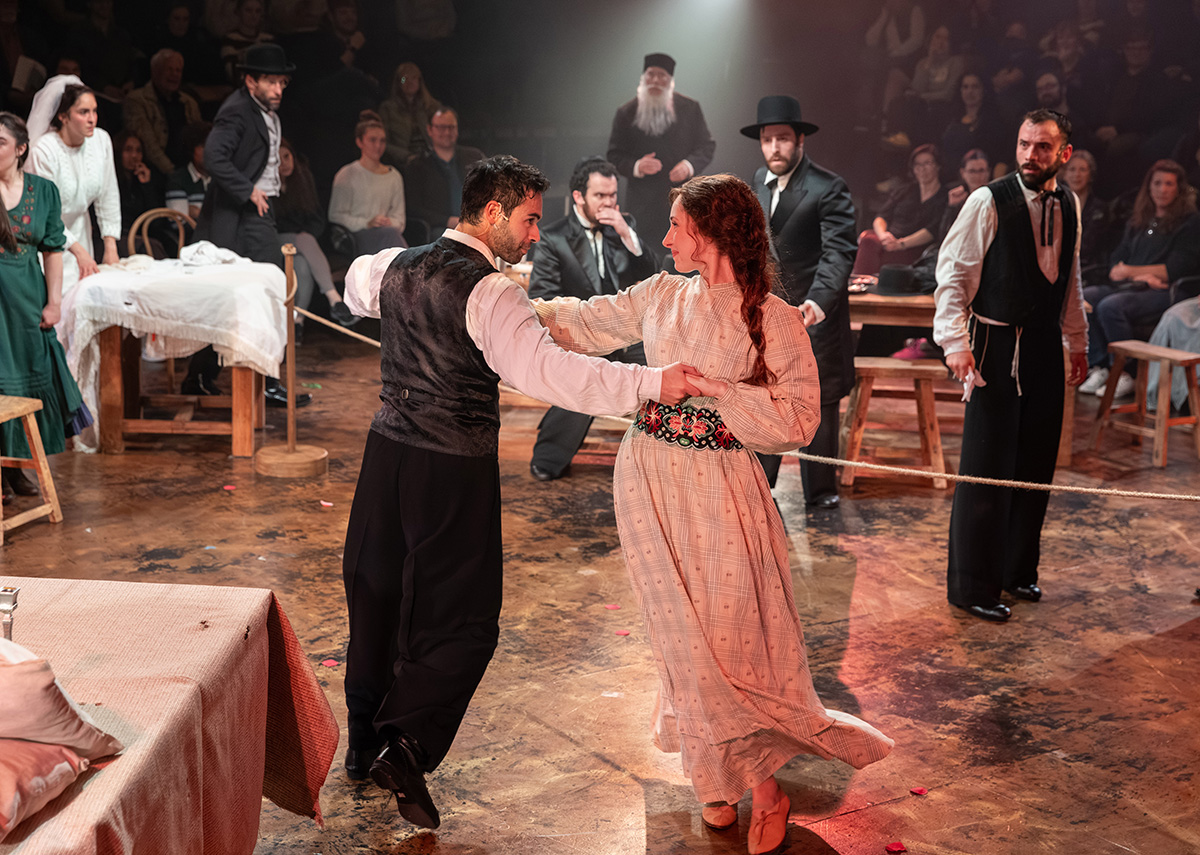
‘Fiddler on the Roof’
Through Jan. 25
Signature Theatre
4200 Campbell Ave.
Arlington, Va.
Tickets start at $47
Sigtheatre.org
Out actor Ariel Neydavoud is deep into a three-month run playing revolutionary student Perchick in the beloved 1964 musical “Fiddler on the Roof” at Signature Theatre in Arlington. And like his previous gigs, it’s been a learning experience.
This time, he’s gleaning knowledge from celebrated gay actor Douglas Sills who’s starring as the show’s central character Tevya, a poor Jewish milkman in the fictional village of Anatevka in tsarist Russia circa 1905.
In addition to anti-Semitism and expulsion, Tevya is struggling with waning traditions in a changing world where his daughters dare suggest marrying for love. Daughter Hodel (Lily Burka) falls for Perchick, an outsider who comes to town brandishing new ideas.
And along with its compelling and humor filled storyline, “Fiddler” boasts iconic numbers like “If I Were a Rich Man,” “Tradition,” “Matchmaker, Matchmaker,” and “Sunrise, Sunset.”
Neydavoud, born and raised as an only child in the West Los Angeles neighborhood lightheartedly referred to as Tehrangeles (due to the large Iranian-American population), has always been passionate about performing. “It’s like I came out of the womb tap dancing,” he says. Fortunately, his mother, an accomplished pianist and composer, served as built-in accompanist.
He began acting and singing at kid camps and a private Jewish middle school alongside classmate Ben Platt. In his teens, Neydavoud spent three glorious weeks at Stagedoor Manor, a well-known theater camp in Upstate New York, where he solidified his desire to pursue theater as a profession, and started to feel comfortable with being queer.
Following high school, he studied at AMDA (American Musical and Dramatic Academy) and soon after morphed from theater student to professional actor.
WASHINGTON BLADE: Your entry into showbiz seems to have been a smooth one.
ARIEL NEYDAVOUD: I’m happy to hear it seems that way. I’d rarely describe anything about this profession as smooth; nonetheless, what I love about this work is that it gives opportunities to have so many new experiences: new shows, new parts, and new communities who come together in a moment’s notice purely for the sake of creating art.
BLADE: Tell us about Perchick.
NEYDAVOUD: He comes to Anatevka and challenges their ideals and way of life. That’s something I can relate to.
I’m Jewish on both sides, but I’m also queer, first generation American, [his mother and father are from Germany and Iran, respectively], and a person of color. I never feel like I belong to a single community. That’s what has emboldened my inner activist to speak up and challenge ideas that I don’t necessarily buy into.
BLADE: You sing beautifully. Perchick’s song is “Now I have Everything,” an Act II melody about finding love. Was it an instant fit for you?
NEYDAVOUD: Not instantly.I’m traditionally a first tenor. Perchick is baritone range, a little outside of my comfort zone. After being cast, I asked our director Joe Calarco if he would be comfortable raising the key, something they did with the recent Broadway revival. He was firm about not doing that.
As an artist I see challenges as opportunities to grow, so it’s been really good exploring my lower register.
BLADE: Audiences have commented on an intimacy surrounding this production.
TK: It’s performed in the round with a dining table at its center. It could be a sabbath or seder table, however you interpret it, but I find it a brilliant way to illustrate community and tradition.
It feels like the audience is invited to the table and join the residents of Anatevka. The show’s moments of joy like the betrothal song “To Life (L’Chaim)” are intensified, and conversely the pogrom scenes are made more difficult. It feels like we’re sharing space.
BLADE: Do your encompassing identities broaden casting possibilities for you?
NEYDAVOUD: Marketing yourself as ethnically ambiguous can be a helpful tool. After “Hamilton” and the pandemic there was more of a shift toward authenticity. I try to steer toward playing Middle Eastern, Southwest Asian, Jewish, and mixed-race characters without being too prescriptive.
BLADE: Tell us your dream roles?
NEYDAVOUD: I’d love to play the Emcee in Cabaret [often portrayed as a gender-fluid, queer-coded, or non-binary figure]. And I’d like to direct a production of “Godspell” with a fully Middle Eastern cast. I think portraying Jesus and disciples in Middle Eastern bodies as Bohemian idealists living under an oppressive regime could be especially impactful.
BLADE: Can today’s queer audiences relate to life on the shtetl?
NEYDAVOUD: As a piece, “Fiddler” is timeless. Beyond the magical score, it hits home with just about anyone who’s ever felt othered. There are relevant themes of displacement and persecution, and maintaining cultural identity in the wake of turbulence, all ideas that tend to resonate with queer people.
Theater
Studio’s ‘Mother Play’ draws from lesbian playwright’s past
A poignant memory piece laced with sadness and wry laughs
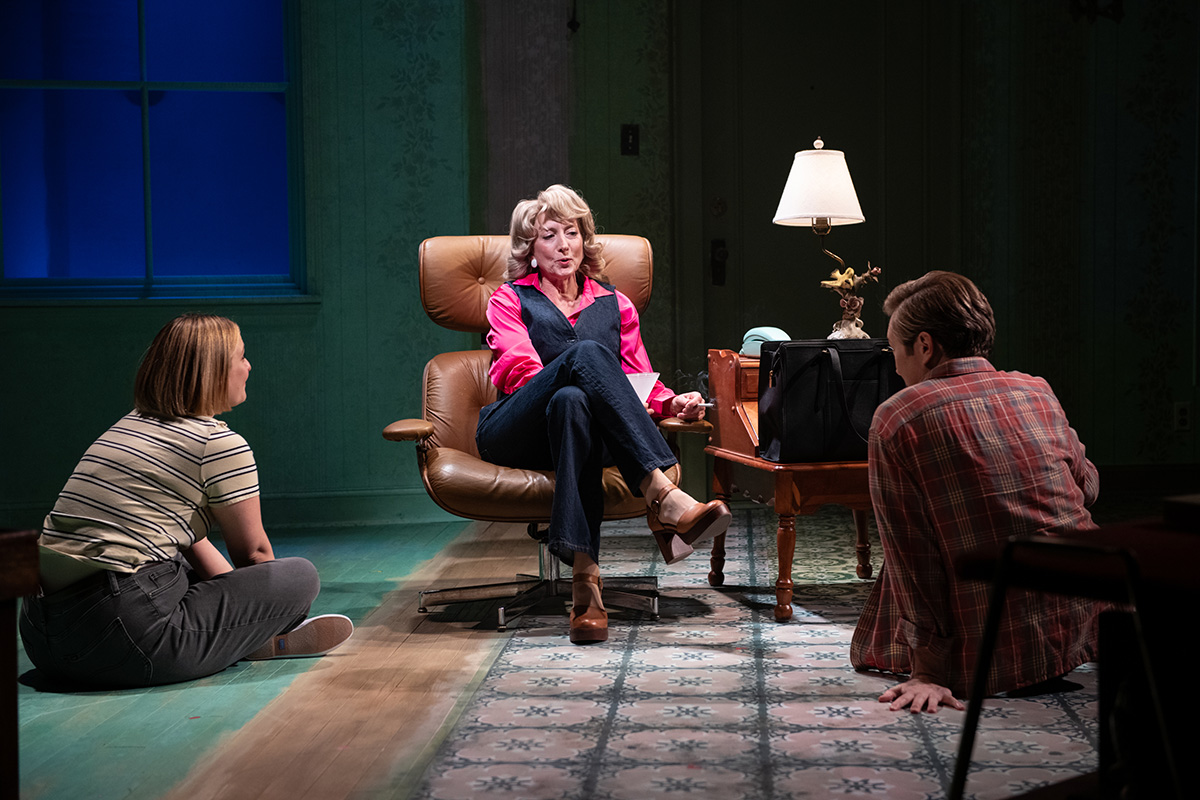
‘The Mother Play’
Through Jan. 4
Studio Theatre
1501 14th St., N.W.
$42 – $112
Studiotheatre.org
“The Mother Play” isn’t the first work by Pulitzer Prize-winning lesbian playwright Paula Vogel that draws from her past. It’s just the most recent.
Currently enjoying an extended run at Studio Theatre, “The Mother Play,” (also known as “The Mother Play: A Play in Five Evictions,” or more simply, “Mother Play”) is a 90-minute powerful and poignant memory piece laced with sadness and wry laughs.
The mother in question is Phyllis Herman (played exquisitely by Kate Eastwood Norris), a divorced government secretary bringing up two children under difficult circumstances. When we meet them it’s 1964 and the family is living in a depressing subterranean apartment adjacent to the building’s trash room.
Phyllis isn’t exactly cut out for single motherhood; an alcoholic chain-smoker with two gay offspring, Carl and Martha, both in their early teens, she seems beyond her depth.
In spite (or because of) the challenges, things are never dull in the Herman home. Phyllis is warring with landlords, drinking, or involved in some other domestic intrigue. At the same time, Carl is glued to books by authors like Jane Austen, and queer novelist Lytton Strachey, while Martha is charged with topping off mother’s drinks, not a mean feat.
Despite having an emotionally and physically withholding parent, adolescent Martha is finding her way. Fortunately, she has nurturing older brother Carl (the excellent Stanley Bahorek) who introduces her to queer classics like “The Well of Loneliness” by Radclyffe Hall, and encourages Martha to pursue lofty learning goals.
Zoe Mann’s Martha is just how you might imagine the young Vogel – bright, searching, and a tad awkward.
As the play moves through the decades, Martha becomes an increasingly confident young lesbian before sliding comfortably into early middle age. Over time, her attitude toward her mother becomes more sympathetic. It’s a convincing and pleasing performance.
Phyllis is big on appearances, mainly her own. She has good taste and a sharp eye for thrift store and Goodwill finds including Chanel or a Von Furstenberg wrap dress (which looks smashing on Eastwood Norris, by the way), crowned with the blonde wig of the moment.
Time and place figure heavily into Vogel’s play. The setting is specific: “A series of apartments in Prince George’s and Montgomery County from 1964 to the 21st century, from subbasement custodial units that would now be Section 8 housing to 3-bedroom units.”
Krit Robinson’s cunning set allows for quick costume and prop changes as decades seamlessly move from one to the next. And if by magic, projection designer Shawn Boyle periodically covers the walls with scurrying roaches, a persistent problem for these renters.
Margot Bordelon directs with sensitivity and nuance. Her take on Vogel’s tragicomedy hits all the marks.
Near the play’s end, there’s a scene sometimes referred to as “The Phyllis Ballet.” Here, mother sits onstage silently in front of her dressing table mirror. She is removed of artifice and oozes a mixture of vulnerability but not without some strength. It’s longish for a wordless scene, but Bordelon has paced it perfectly.
When Martha arranges a night of family fun with mom and now out and proud brother at Lost and Found (the legendary D.C. gay disco), the plan backfires spectacularly. Not long after, Phyllis’ desire for outside approval resurfaces tenfold, evidenced by extreme discomfort when Carl, her favorite child, becomes visibly ill with HIV/AIDS symptoms.
Other semi-autobiographical plays from the DMV native’s oeuvre include “The Baltimore Waltz,” a darkly funny, yet moving piece written in memory of her brother (Carl Vogel), who died of AIDS in 1988. The playwright additionally wrote “How I Learned to Drive,” an acclaimed play heavily inspired by her own experiences with sexual abuse as a teenager.
“The Mother Play” made its debut on Broadway in 2024, featuring Jessica Lange in the eponymous role, earning her a Tony Award nomination.
Like other real-life matriarch inspired characters (Mary Tyrone, Amanda Wingfield, Violet Weston to name a few) Phyllis Herman seems poised to join that pantheon of complicated, women.
-

 Sponsored5 days ago
Sponsored5 days agoSafer Ways to Pay for Online Performances and Queer Events
-

 District of Columbia4 days ago
District of Columbia4 days agoTwo pioneering gay journalists to speak at Thursday event
-

 Colombia4 days ago
Colombia4 days agoBlade travels to Colombia after U.S. forces seize Maduro in Venezuela
-

 a&e features4 days ago
a&e features4 days agoQueer highlights of the 2026 Critics Choice Awards: Aunt Gladys, that ‘Heated Rivalry’ shoutout and more




















